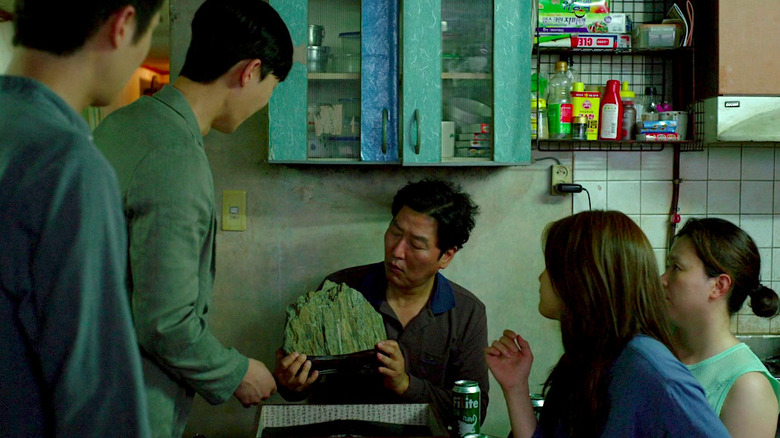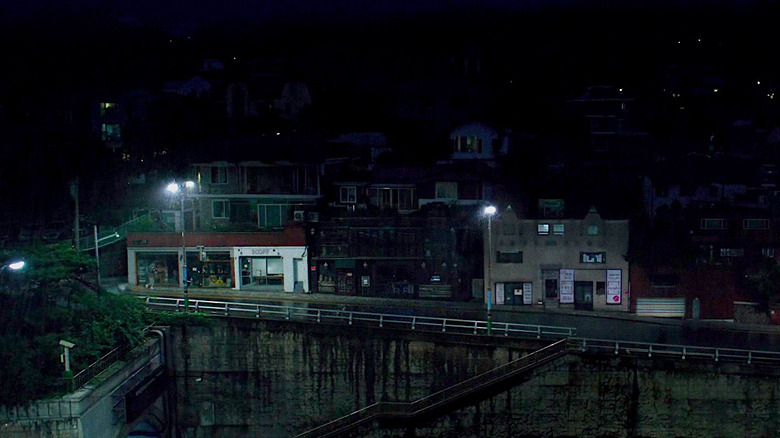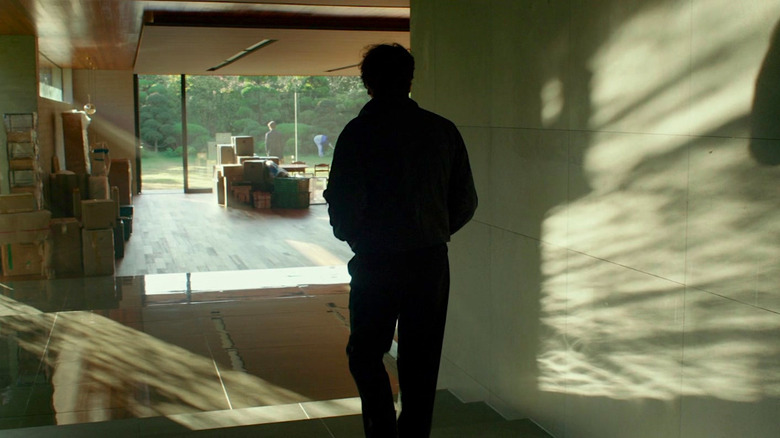Parasite Ending Explained: There Is No Rising Up For The Kim Family
Bong Joon-ho's Oscar-award-winning film "Parasite" made cinematic history in 2019. Not only was it the first South Korean film to win the prestigious Palme D'or and the Academy Award for Best Picture, but it was also the first non-English language film to win the latter award. All of its accolades are deserved! "Parasite" is one of the most riveting films to grace movie screens in a while. Bong makes a movie that feels equal parts heist and family drama, bringing twists that leave audiences speechless long after the credits role.
"Parasite" follows the Kim family, (barely) making a living by pooling their money and performing odd jobs. When their son, Ki-woo (Choi Woo-shik), discovers an opportunity to teach English to a wealthy family's young daughter, the rest of the Kim family con their way into performing high-paying work for the Park family. Ki-jung (Park So-dam) poses as an art therapist for the Park's young son. Chung-sook (Jang Hye-jin), their mom, becomes the Park's maid, and their father, Ki-taek (Song Kang-ho), takes on the role of chauffeur for the snobbish patriarch, Mr. Park (Lee Sun-kyun). Initially, their plan seems foolproof. But a surprise reveal threatens to upend everything.
Aside from being extremely fun to watch, "Parasite" is a remarkable allegory for class warfare. However, its oblique ending leaves a lot of things unanswered. Let's take a look at some of the film's symbolism and themes to develop a clearer picture of what the film's ending means for the Kim family's future.
What's the deal with that fancy rock?
To understand the ending of "Parasite," we need to examine the stone given to the Kim family. Ki-woo's friend gifts the Kim family a suseok or "scholar's stone," as it brings a promise of bestowing wealth and good fortune. In certain Asian cultures, these stones reflect the natural world, providing people with an opportunity to appreciate nature's beauty. Suseok is typically naturally occurring — not chiseled or carved by human hands. They received their English name from being displayed on the writing desks of Confucian scholars during the Joseon Dynasty.
When the Kims receive their rock, Mr. Kim believes it will bring good fortune to his family. However, the opposite occurs. At first, the Kims are successful in infiltrating the Park household. But things go awry when they discover a secret bunker harboring the recently fired maid Gook Moon-gwang's (Lee Jung-eun) husband, Oh Geun-sae (Park Myung-hoon). Talk about a change in plans! In the film's climactic scene, Geun-sae uses the scholar's rock to bludgeon Ki-woo, leaving him incapacitated on the Park's kitchen floor.
The rock represents the Kim family's desire to achieve more in life than folding pizza boxes. However, their unorthodox climb up the social ladder is — much like the rock — a false promise. The rock punishes them, bringing their downfall — symbolizing that aspirational wealth is their demise. For the Kims, unfortunately, good fortune and wealth are things they can only gaze at longingly.
The descent of the lower class
Some might interpret "Parasite" as a cautionary tale about what happens when people get too greedy. However, the message of "Parasite" is more complex. The film is a complex analysis of class warfare, systematically setting the Parks up for success as the Kim family suffers — even alluding to the real-life "chicken place" economic collapse that hit South Korea in the '90s.
"Parasite" highlights this class divide through its cinematography — depicting the Kim family as lower on-screen. Visually, the family crouches down often and lives in a basement apartment they rise out of daily to work for the Park family. However, they must descend to their lower-class existence at the end of each day. With the discovery of Geun-sae (another example of the lower class living undetected below the upper class), the Kim family's fantasy life falls apart. When Ki-woo, Ki-jung, and Ki-taek rush back to their basement apartment in the rain, Bong treats us to a series of shots of the trio literally sinking back into poverty. They descend multiple staircases until eventually reaching their now-flooded home, which, much like their con with the Parks, shows little hope of being repairable.
The Kim family, Moon-gwang, and Geun-sae exist undetected underground as the wealthy tread on top of them. (Geun-sae and eventually Ki-taek can only exit the bunker in secret). Their financial struggles go unnoticed by the Park Family, a symbol of the upper class. When Ki-taek makes the fatal mistake of stabbing Mr. Park, he recognizes he will never be able to have the life Mr. Park has. Thus, he decides to retreat to the Park's basement — descending into the poverty he has always known. His return to an underground life completes the cycle of poverty that many lower-class families face.
Morse coding our way to an understanding
By the end of Bong's "Parasite," Ki-woo and his mother are on probation for their fraudulent crimes. They live in their original basement apartment. However, when Ki-woo realizes the blinking lights at the Park's house are morse code, he discovers his father is living in the secret bunker. At the film's end, Ki-woo — now a successful businessman — has made enough money to buy the Park's house and free his father. In one of the film's most touching scenes, we see Ki-taek ascend from the depths of the secret bunker to find his son waiting for him in the light. Ki-woo's success means his father no longer has to keep his struggles or life secret.
However, this is an imagined scene. The film ends without us knowing if Ki-woo ever achieves his plan. We hope he does. But if the film has taught us anything, it's that it's impossible to ever ascend from the lower class. Even if Ki-woo made enough money to buy the Park's house, the police would still be looking for his father. Sure, his dad could live freely within the confines of their house, but he would never be able to leave. Therefore, he would still be a prisoner of his actions and class.
Ki-woo's fantasy is a good dream; ultimately, it is unachievable. The three surviving members of the Kim family will most likely always live a lower class life — forever occupying literal and metaphorical basements as the wealthy carry on above them, unaware and unbothered.



